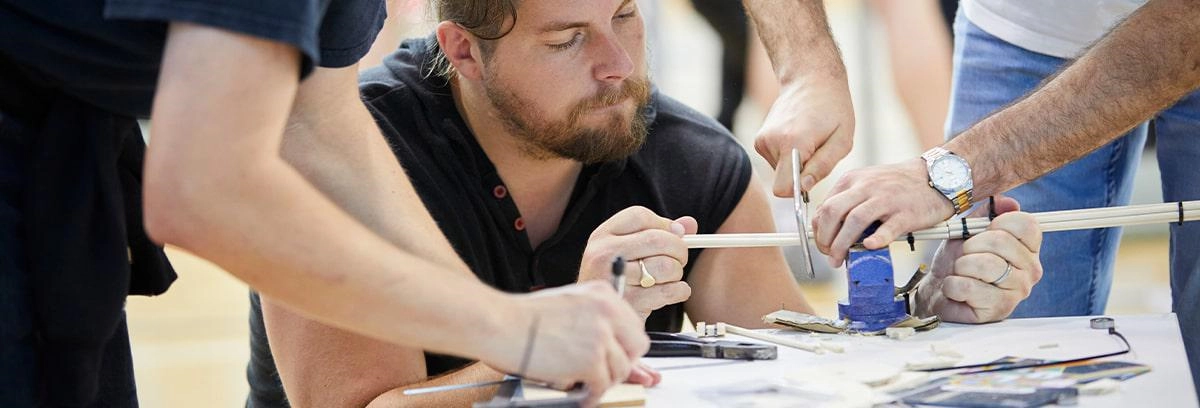FdEngRenewable Energy Engineering
Register your interest
- 2 years full-time
- 4 years part-time
Why study a Renewable Energy Engineering foundation degree at Solent University
Advance your engineering career in a fast-changing field and make a positive impact on the environment.
- 0thuniversity in the UK for low carbon emissions (THE 2023)
- 0thin the top 20 best student cities (StudentCrowd, 2023)
- £0invested in our campus estate and facilities
- Comprehensive curriculum covering various renewable energy technologies, including solar, wind, wave and hydro.
- Access to a range of high-end facilities including 3D printers and laser-cutters, PSpice/NI MultiSim software and microcomputer development systems, digital multi-meter signal generators, FLIR cameras and digital signal processing boards.
- Strong focus on hands-on exploration. This degree incorporates practical projects and field trips to renewable energy facilities, so you can put theory into practice straight away.
- Solent is a pioneer in environment and engineering research – you will learn direct from leading experts in their field.
- Solent University is part of a research and innovation collaboration that has been awarded almost €16 million to look at the options for green technology in the maritime industry.
- You’ll be assigned a personal tutor who can assist you with pastoral support to help you make the most of your learning.
- You can study this course part-time.
Course overview
With the essential need for qualified engineers to meet the demands of the growing renewable energy industries such as solar, wind, hydro, biomass, and geothermal, the focus on this practical course provides the training and skills to make readily employable graduates in a variety of technical roles.
You'll be able to gain a broad understanding of the principles and practices of renewable energy engineering, preparing you for both STEM, general engineering and renewable engineering industries, and any branch of engineering which includes the efficient and environmentally conscious use of energy.
This course has been developed in collaboration with the South Coast Institute of Technology, providing partnerships with well known employers including The Royal Navy, Portsmouth International Port and Maritime UK Solent, who contribute to the economic growth of the South Coast.
Develop your abilities in applying mathematical and scientific principles to analyse and solve renewable energy engineering problems, and discover a range of renewable energy technologies and their applications, whilst fostering an appreciation of environmental sustainability, ethical conduct, safety, and professional standards in renewable energy engineering.
The course also has strong links with industry leaders, who will not only provide industry insights, but also give you unique opportunities for networking. And with the freedom to explore sustainable design and innovation through real-world learning, you can graduate well prepared to tackle real-world energy challenges in industry.
Any questions?
Contact international admissions
Email: Call:Part of:

Course features
Specialist facilities
This course has access to specialist facilities
Who is this course for?
The Renewable Energy Engineering course at Solent is perfect for students who are committed to finding sustainable solutions to the world's energy needs. Applicants should have a background in science, technology, engineering, or mathematics (STEM) subjects and be motivated to explore innovative ways to harness renewable energy sources. An understanding of environmental issues and a desire to make a positive impact are key.
What does this course lead to?
With a growing need for qualified engineers to meet demands in several key industries, graduates will be well placed to be part of the next generation of engineers to fill vital jobs across the engineering and renewable energy industries.
Graduates on this course can also join the final year undergraduate BEng Renewable Energy Engineering course, subject to grades achieved.
Meet the team

Dr Sinan Khwandah
Lecturer

Dr Fayyaz Rehman
Associate Professor

Dr Laurie Wright
Associate Professor of Marine Sustainability

Dr Puja Mishra
Lecturer

Dr Tony Morris
Senior Lecturer

Dr Abdulla Tahhan
Lecturer

Trevor Bullman
Technician Instructor

Dr Nils Bausch
Course Leader

David Hawkins
Associate Lecturer

Dr Shehu Yusha’u
Lecturer
The University cannot guarantee any particular members of staff will teach specific aspects of the course in the future, but will endeavour to ensure the teaching team maintains their balance of experience and qualifications.
Facilities
To aid study, students have access to our specialist facilities, including a 60m towing tank for wave generation and tidal turbine use; composite materials laboratory for construction of lightweight structures; and our materials testing laboratory.
Our vibrant campus brings state-of-the-art facilities to enhance your learning and elevate your student experience. Our award-winning teaching building, The Spark is centred around students and offers a stimulating study environment with flexible learning spaces. Away from studying, why not try out the gyms, fitness studios and sports halls in our £28 million Sports Complex, or watch a blockbuster film at our student-run cinema with Dolby Atmos audio.
What you'll study
Core modules
Applied Mathematics
On this module you will learn how to apply a range of mathematical techniques to realistic engineering problems. You will use basic algebra and solve simultaneous equations and equations of straight lines to answer engineering problems around linked variables in mechanics and electronics.
CAD and the Design Process
The aim of the module is to demonstrate the role of an engineer as an engineering designer. This module is designed to foster an understanding of the fundamentals of the engineering design process and its various stages. It equips you with theoretical and practical technical knowledge to design a product by going through the various stages of the design process.
Introduction to Electronics
This module is designed to introduce you to the electrical and electronic principles necessary to analyse circuit behaviour and design. It also provides the foundation for further study of more specialised electrical/electronic engineering techniques used later in your course.
Manufacturing Principles
This module helps you to develop an awareness of the factors affecting the selection of materials and processes used in manufacturing a product. It does this by comparing the attributes of materials and the suitability of processes in the light of the external factors that need to be considered when developing the product design specification.
Mechanical Principles
This module will give you an understanding of the fundamental principles used by engineers to design vehicles, machines and buildings. You will learn to analyse forces on the performance of machines and structures and how to conduct tests and experiments to confirm the results on your analysis.
Professional Engineering Skills
This module will introduce you to the profession of engineering. This includes both theoretical and professional skills relating to the role of the professional engineer and also supports your transition into higher education.
How you will learn and be assessed
You will learn by:
You may be assessed by a combination of:
- Coursework
- Individual presentations
- Group presentations
- Written exams
- Timed exercises
- Project work
Solent’s curriculum framework builds on our unique, creative and applied approach to teaching. The transformation of students’ lives is at the heart of our mission as a university, and our curriculum – informed by the latest theory – reflects this shared educational vision.
Find out more
Study support
The student achievement team are on hand to help you succeed during your studies at Solent. They aim to contact you at key times during your time here with personalised information, advice and guidance, by email or phone.
The disability advice team provides information, advice and guidance for disabled students.
All students can access Succeed@Solent, Solent's online guide to getting better grades. It offers extensive, practical information and advice on topics such as academic writing, research and presentations.
Why choose renewable energy engineering?
There is a growing need for qualified engineers to meet demands in several key industries and studying renewable energy engineering means you could join the next generation of engineers to fill current vital jobs. A focus on practical training and skills development makes graduates readily employable in technical roles.
This course is run in collaboration with the South Coast Institute of Technology and this this partner organisation works with well known employers including The Royal Navy, Portsmouth International Port and Maritime UK Solent, to deliver industry-led courses which fill skills gaps and support the economic growth of the South Coast.

You could earn:
Energy engineer
Starting salary: £25,000 to £35,000
As an energy engineer, you'll be involved with the production of energy through natural resources, such as the extraction of oil and gas, as well as from renewable or sustainable sources of energy, including biofuels, hydro, wind and solar power. This could include designing and testing machinery, developing ways of improving existing processes, converting, or transmitting and supplying useful energy.
Technical sales engineer
Starting salary: £20,000 to £30,000
Science and engineering graduates with communication and sales skills face good prospects as the demand for technical sales engineers increases
As a technical sales engineer, you'll use your technical knowledge along with sales skills to provide advice and support on a range of products, for which a certain level of expertise is needed.
The stated salaries are published on prospects.ac.uk. Income figures are intended as a guide only.
Solent Careers
The Solent Careers team is committed to getting students into great careers.
While you are studying, the team can help you with finding work experience or placements, link you with a mentor, check your CV, or offer one-to-one guidance.
If you're in your final year, we also have graduate job opportunities just for Solent graduates.

6th
UK uni for sustained employment
Longitudinal Educational Outcomes, 2022
Part of:
Part of:

Tuition fees
The tuition fees for the 2025/26 academic year are:
- UK, ROI, EU (settled status) and Channel Island full-time fees: £9,535 per year
- International full-time fees: £16,125 per year
For further information, please visit our tuition fees page.
Extra course costs
While most course costs are covered by your tuition fees, some essential resources and optional extras may need to be paid for separately. These additional costs are listed below. For advice on budgeting and managing your money, please contact student.funding@solent.ac.uk.
The 2025/26 other costs are not yet available. For guidance, the 2024/25 other costs were:
Other optional costs:
- PPE £50
- Project consumables: £100
Bursaries, scholarships and financial support
Solent University offers a range of bursaries and scholarships that provide financial assistance or waive fees for tuition or accommodation. Each bursary or scholarship has specific eligibility criteria. Check out our bursaries and scholarships pages to find out more.
Cost of living support
At Solent, we understand that the cost of living crisis may be of some concern. To help, we've put together some detailed information to show what support is available and how to make your money go further.
Graduation costs
There is no charge to attend graduation, but you will be required to pay for the rental of your academic gown (approximately £45 per graduate, depending on your award). You may also wish to purchase official photography packages, which range in price from £15 to £200+. Graduation is not compulsory, so if you prefer to have your award sent to you, there is no cost. Extra guest tickets will go on sale after results publication and will be sold on a first-come-first-served basis. The cost per ticket is currently £15. Please note, we do not guarantee there will be any extra tickets available to purchase.
Student finance videos
Student finance Video transcript, with a description of visuals available.Student funding - the essentials Video transcript, with a description of visuals available.
Entry requirements
Please select an option below:
Key entry requirements
64 - 96 UCAS tariff points
- Completed A-levels, BTEC Diploma at MP, T-level Pass (D or E) or equivalent.
- For further information about UK qualifications, please contact admissions.
Key entry requirements
As a general guide, we look for qualifications that are equivalent to the British high school A-levels.
If you are applying from outside the UK, find information about entry requirements, visas and agents for your country here.
For further information about EU qualifications, please see our course entry requirements document.
For international students who do not meet the direct entry requirements for this undergraduate degree, our trusted partner, QA Higher Education offers the following pathway programme designed to develop your academic and English language skills:
- International Foundation Year - for progression to the first year of an undergraduate degree
Key entry requirements
As a general guide, we look for qualifications that are equivalent to the British high school A-levels.
If you are applying from outside the UK, find information about entry requirements, visas and agents for your country here.
For further information about international qualifications, please see our course entry requirements document.
For international students who do not meet the direct entry requirements for this undergraduate degree, our trusted partner, QA Higher Education offers the following pathway programme designed to develop your academic and English language skills:
- International Foundation Year - for progression to the first year of an undergraduate degree
Note to all international students requiring a visa
All international applicants need to be aware that the English language requirements to attend Solent University, and the English language requirements to obtain a visa from the Home Office, may be different. This means that if you meet the Solent University language requirement to gain a place on the course, you may still have to meet additional requirements to be granted with a visa by the Home Office.
We strongly advise all applicants to visit the Home Office website which outlines all the requirements for a successful visa application
Any questions?
Contact international admissions
Email: Call:How to apply
Full-time
Any student applying for the first year of a full-time/sandwich undergraduate course must apply through UCAS (University and Colleges Admissions Service). This includes mature, overseas and EU students.
Nearly all schools and colleges offer their students the facility of applying electronically through the UCAS website using 'Apply'; it may also be used by those applying independently in the UK and overseas. This facility and all course information can be found on the UCAS website: www.ucas.com.
Your application should reach UCAS by 31 January if you hope to enter a course the following autumn. Early application is advised for the most popular subject areas. Late applications may be made until the end of June. The UCAS Code for the University is S30, code name SOLNT.
Find out what happens after you apply
Contextual offers
Solent endeavours to offer learning opportunities to students from all backgrounds. When we receive and review an application, we take into consideration the context and personal circumstances of applicants when making a decision, which means our advertised entry tariff could be reduced.
Language requirements
Applicants who do not have English as their first language will be required to demonstrate an approved level of proficiency in the use of the English language. The agreed minimum requirements for this course are:
- IELTS minimum 6.5 overall with no component score below 5.5
- TOEFL IBT 92 with a minimum of 22 in writing and a minimum of 20 in reading, listening and speaking
- Duolingo English Language Test - 115 overall with minimum of 100 in each component or equivalent.
Qualifications are checked before enrolment, and international students must bring their original certificates or certified copies when coming to study at the University.
Pre-Sessional English programme
The University also offers a pre-sessional English programme for international students who wish to improve their level of English before starting a degree course.


Make your application
- 2 years full-time
- 4 years part-time






